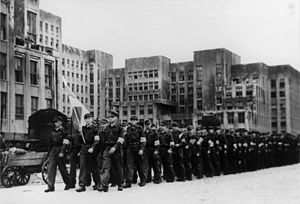Bielaruskaja Krajevaja Abarona
| Belarusian Home Defense | |
|---|---|
| Беларуская Краёвая Абарона Bielaruskaja Krajovaja Abarona' |
|

Belarusian Home Defense corps (BKA)
|
|
| Active | February 23, 1944 – April 28, 1945 |
| Country |
|
| Allegiance | Nazi Germany |
| Size | 28,000 troops |
| Patron | Radasłaŭ Astroŭski |
| Colours | Feldgrau |
| Anniversaries | February 23 |
| Engagements | The Axis Battle of Monte Cassino, Aftermath of World War II |
| Commanders | |
| Notable commanders |
Barys Rahula Francišak Kušal Ivan Yermachenka |
| Insignia | |
| Identification symbol |
|
The Belarusian Home Defence, or the Byelorussian Home Guard (Belarusian: Беларуская краёвая абарона, Bielaruskaja Krajovaja Abarona, BKA) was a name of the collaborationist battalions of the Belarusian Central Rada (1943-1944), a pro-Nazi Belarusian council within Reichskommissariat Ostland during World War II.
The BKA operated from February 23, 1944 to April 28, 1945. The 20,000 strong Belarusian Home Defence Force was formed under the leadership of Commissioner-General Curt von Gottberg, with logistical help from the German 36th Waffen Grenadier Division of the SS known as the "Poachers' Brigade" commanded by Oskar Dirlewanger.
After the Wehrmacht suffered two major strategic defeats at Stalingrad (in February 1943) and at Kursk (in August 1943) the Germans made some concessions to the Belarusian collaborators by proposing a Belarusian quasi-state. Assistance was offered by the local administrative governments from the Soviet era, and former members of public organizations including the Soviet Belarusian Youth.
On March 6, 1944 the general mobilization of all healthy men born between 1908 and 1924 into the BKA started. Some 40,000 individuals reported to recruitment bureaus set up in seven cities; although 30% of them were sent back home on German orders for overcrowding. From each region (Uezd) about 500 to 600 men were recruited, for the total of 28,000 soldiers ready for training.
On March 26, all men already enlisted to the BKA gave their oath at Freedom Square in Minsk: "I swear, that arm to arm with the German soldier, I will not lay down my weapons until there is peace and security in our farms and cities, until in our land the last enemy of the Belarusian people is destroyed."
The oath was accepted by the BKA Belarusian commander Ivan Yermachenka, in the presence of the SS and Police Leader Curt von Gottberg. The president of the Belarusian Central Rada Radasłaŭ Astroŭski had concerns that some Soviet partisans might have infiltrated the new BKA structures and that therefore it would need a thorough inspection afterwards.
...
Wikipedia
